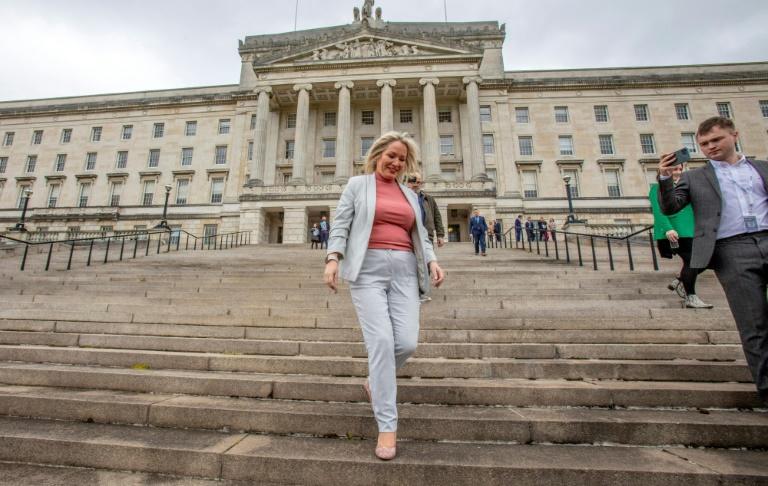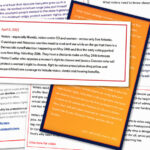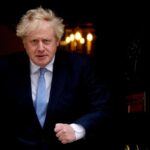
UK Prime Minister Boris Johnson on Monday urged Northern Ireland’s fractious political parties to set aside disputes over post-Brexit trade rules which are preventing power-sharing, during a visit to the province that showed few signs of success.
Johnson held separate meetings with the leaders of the five biggest Northern Irish parties, in a bid to get them to form a new executive nearly two weeks after pro-Irish party Sinn Fein scored a historic elections win.
Its first victory in voting for the devolved Stormont assembly should see the party claim the role of first minister, but has collided with tensions over Brexit to result in stalemate.
The runners-up, the pro-UK Democratic Unionist Party (DUP), has refused to resume power-sharing — or even elect a new speaker allowing the assembly to sit — until Northern Ireland’s contentious trading rules are overhauled.
Unionist parties argue the so-called “Northern Ireland Protocol”, agreed as part of Britain’s 2019 withdrawal deal with the European Union, undermines its place within the UK because it mandates checks on goods arriving from England, Scotland and Wales.
Johnson’s government also insists the protocol is threatening the delicate balance of peace in Northern Ireland between the pro-Irish nationalist community and those in favour of continued union with the UK.
It has warned it will trigger a suspension clause in the agreement, or legislate to eliminate its requirements from UK law, unless the EU agrees to large-scale changes.
“We don’t want to scrap it, but we think it can be fixed,” Johnson told reporters after his meetings, insisting he had implored all Northern Ireland’s main parties to resume power-sharing.
“I said to the DUP in particular, we want to see you back in the executive… we want to see a speaker in the assembly,” he added. “You need the executive, you need the assembly”.
– ‘Decisive action’ –
But the DUP, which is demanding Johnson unilaterally overhauls the protocol before they will form a new executive, showed little sign of heeding his calls.
“The tabling of legislation is words. What I need is decisive action,” its leader Jeffrey Donaldson said. “We will examine what they do, we will make our own assessments… as to how we respond.”
Meanwhile, Sinn Fein president Mary Lou McDonald described its meeting as “fairly tough” and accused Johnson’s government of “placating the DUP”.
“We have put it to him very directly that the absolute priority is getting government working here in the north,” she said.
“It’s not good enough for anybody, the DUP or the British government, to hold society here to ransom.”
Johnson’s spokesman in response reiterated the UK government’s view that the protocol is adversely impacting businesses in Northern Ireland and that “significant change” is needed to it.
Foreign Secretary Liz Truss will address parliament Tuesday “to set out the rationale for our approach”, he confirmed.
Johnson defended the approach, amid fears it could spark a trade war with Brussels, the UK’s largest trading partner, just as both sides are grappling with a cost-of-living crisis.
“We would love this to be done in a consensual way with our friends and partners, ironing out the problems… but to get that done, to have the insurance, we need to proceed with a legislative solution at the same time,” he said.
– ‘Compromise’ –
Earlier Monday, Irish Foreign Minister Simon Coveney warned London against taking unilateral action.
“Northern Ireland is about compromise and trying to find middle-ground positions that everybody can live with, to maintain political stability,” Coveney told journalists in Brussels.
“To act unilaterally to break international law, to not respect the democratic decisions in Northern Ireland would make matters significantly worse, not better, in terms of trying to solve the problems of the protocol.”
“That is the last thing Europe needs right now when we’re working so well together in the face of Russian aggression and responding to the support needed for Ukraine at this time.”
The protocol mandates checks on goods coming to the province from England, Scotland and Wales, to ensure no return of a physical border between Northern Ireland and EU member Ireland to the south.
The elimination of the hard border was a key strand of the 1998 Good Friday Agreement, which ended three decades of sectarian violence in Northern Ireland.
Johnson’s visit coincides with a delegation from the US Congress. The United States was a guarantor of the Good Friday Agreement, and has expressed alarm at the UK’s threats over the protocol.
cjo-jj/gw




